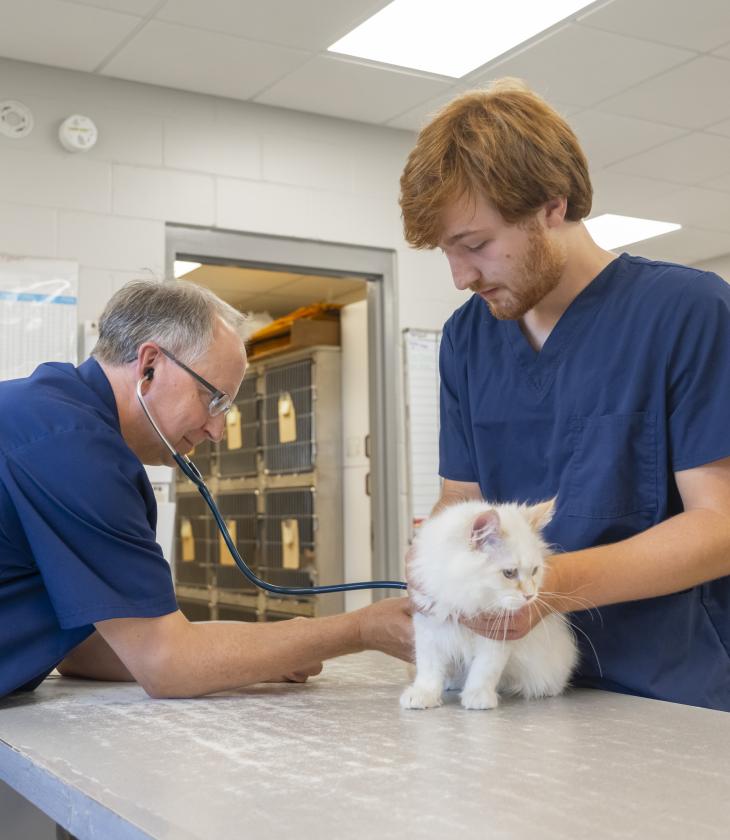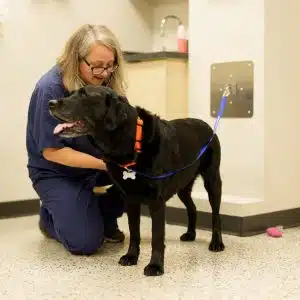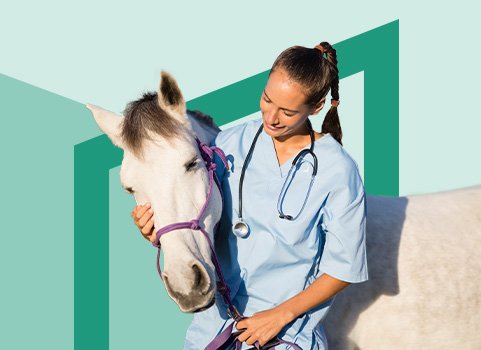Comprehending the Duty of a Veterinary Oncologist in Your Pet dog's Cancer cells Care
A vet oncologist focuses on diagnosing and treating cancer in animals. Their proficiency is important for establishing tailored treatment strategies that deal with the special demands of each family pet. Early medical diagnosis can substantially affect results, making their duty much more crucial. Comprehending the numerous treatment choices and just how these experts work together with main veterinarians is essential. What techniques do they utilize to enhance your family pet's lifestyle throughout this tough time?

What Is a Veterinary Oncologist?
A veterinary oncologist is a customized veterinarian who concentrates on identifying and treating cancer cells in family pets. These experts have sophisticated training in both vet medication and oncology, enabling them to understand the complexities of malignant illness in pets. Their knowledge allows them to carry out a selection of diagnostic procedures, consisting of imaging strategies and research laboratory examinations, to precisely recognize various sorts of cancers cells in pet dogs.
Along with medical diagnosis, vet oncologists develop customized treatment plans, which might consist of surgery, radiation treatment, radiation therapy, or palliative treatment. They function very closely with pet proprietors to explain treatment choices and prospective outcomes, guaranteeing that families make notified decisions concerning their pets' care. Moreover, veterinary oncologists usually collaborate with other veterinary professionals and family doctors, developing a complete technique to pet wellness. By concentrating on cancer care, they play a critical role in enhancing the high quality of life for family pets diagnosed with malignancies.
The Value of Early Diagnosis and Therapy
Early medical diagnosis and therapy of cancer in animals considerably boost the possibilities of effective results and enhanced top quality of life. Veterinary oncologists can apply targeted interventions that may slow disease development and relieve signs and symptoms when cancer is identified in its very early phases. This aggressive technique enables much better management of the illness, potentially causing longer survival times and boosted convenience for the animal.
In addition, early discovery typically suggests that treatment choices may be much less invasive and more efficient, reducing the general problem on both the animal and its proprietor. Regular veterinary check-ups and understanding of subtle behavioral modifications are essential, as they can promote timely diagnoses. Owners need to remain cautious and consult their vet at the first indication of problem. Veterinary Oncologist. Ultimately, an early diagnosis encourages animal owners to make enlightened choices regarding their pet dog's care, considerably affecting the general trip via cancer management
Treatment Choices Offered by Veterinary Oncologists
When encountered with a cancer diagnosis, pet owners can discover a range of therapy alternatives given by veterinary oncologists that are tailored to the certain requirements of their animals. These experts usually provide a combination of surgical procedure, chemotherapy, radiation therapy, and immunotherapy. Surgical intervention may aim to eliminate lumps or impacted cells, while radiation treatment makes use of medicines to target and kill cancer cells, usually carried out in cycles.
Radiation treatment concentrates on utilizing high-energy rays to diminish tumors and ease pain. Immunotherapy, a much more current improvement, utilizes the pet's immune system to combat cancer cells better. Added helpful therapies, such as discomfort monitoring, dietary support, and palliative care, are likewise important parts of a detailed treatment plan. By reviewing each case independently, veterinary oncologists ensure that the selected therapy aligns with the animal's overall health and cancer cells type, maximizing the chances of a positive outcome.
The Collaborative Strategy: Dealing With Your Main Veterinarian
Collaboration between primary veterinarians and vet oncologists is important for offering extensive like pets diagnosed with cancer cells. This collaboration assures a complete approach to therapy, combining the specialized knowledge of oncologists with the continuous care given by main veterinarians. Together, they evaluate the pet dog's health, create personalized therapy plans, and keep an eye on the pet's progress throughout the cancer journey.
Key veterinarians usually work as the preliminary factor of get in touch with, identifying possible signs of cancer cells and referring people to oncologists for specialized diagnostics and treatment choices. Adhering to the oncologist's suggestions, the main veterinarian plays a crucial function in handling the animal's total health and wellness, consisting of discomfort monitoring and encouraging care.
Efficient interaction in between these experts promotes a unified strategy, permitting prompt treatments and changes to therapy as required. This collective approach ultimately enhances the top quality of care and assistance for animals and their proprietors during a challenging time.


Supporting Your Pet Dog Through Cancer Cells Care
Supporting a pet dog via cancer cells care calls for a complete understanding of the physical and emotional challenges dealt with by both the animal and its owner. Caretakers must listen to the family pet's altering needs, which may consist of managing discomfort, adjusting diet plans, and keeping track of adverse effects from treatments. Giving a comfy, trouble-free setting is necessary for the family pet's well-being.
Emotional support is just as important; proprietors need to seek to stay positive and engaged while recognizing their very own feelings of anxiety and unhappiness. Developing an assistance network, including veterinarians, family, and buddies, can relieve some burdens.
In addition, pet owners need to educate themselves concerning the particular kind of cancer cells and therapy options available, cultivating educated conversations with veterinary oncologists. Eventually, a caring technique, integrated with positive treatment and support, can enhance the pet dog's lifestyle throughout this challenging trip.
Regularly Asked Inquiries
Exactly how Do I Choose the Right Veterinary Oncologist for My Pet dog?
Selecting the right veterinary oncologist includes looking into credentials, seeking recommendations, assessing experience with details cancers, gauging interaction styles, and checking out clinics to guarantee a comfortable environment for both the pet and proprietor throughout therapy.
What Should I Anticipate Throughout the First Visit?
During the very first you could look here visit, the pet dog proprietor can advice expect a detailed examination, discussion of medical history, analysis examinations, and a therapy strategy rundown. The veterinarian will resolve problems and supply support for continuous care.
Are There Any Prices Related To a Vet Oncologist's Services?
Costs connected with a veterinary oncologist's solutions can differ substantially based upon area, therapy intricacy, and needed diagnostics. Pet Cancer Surgery. Pet dog owners need to anticipate expenditures for consultations, examinations, and potential ongoing treatment strategies tailored to their pets' requirements

Can My Pet Still Obtain Regular Veterinary Treatment While Seeing an Oncologist?
Family pets can receive normal vet care while seeing an oncologist. Coordinating treatments guarantees extensive health and wellness monitoring. Normal exams complement specialized cancer treatment, allowing for alternative tracking of the pet dog's general health and resolving various other health and wellness concerns.
What Resources Are Offered for Pet Owners During Their Pet's Cancer Journey?
Numerous resources are readily available for family pet proprietors maneuvering their pet dog's cancer cells trip, consisting of support teams, on the internet forums, instructional web sites, and economic aid programs, all aimed at giving assistance, emotional assistance, and functional info throughout this tough time.
A veterinary oncologist is a specialized veterinarian who concentrates on detecting and dealing with cancer cells in family pets. They work carefully with pet dog proprietors to clarify treatment options and potential results, ensuring that households make notified decisions concerning their pet dogs' treatment. When faced with a cancer cells medical diagnosis, pet proprietors can check out a variety of treatment alternatives given by vet oncologists that are customized to the particular requirements of their animals. Cooperation in between veterinary oncologists and main vets is vital for providing comprehensive care to animals identified with cancer cells. Additionally, pet dog owners need to enlighten themselves concerning the more information specific type of cancer cells and treatment options readily available, cultivating informed discussions with vet oncologists.